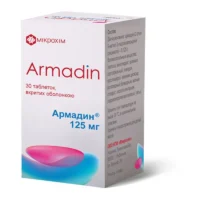Description
Soleron 100 (Amisulpride) Tablets 100 mg. №30
Ingredients
Active ingredient: Each tablet contains Amisulpride 100 mg.
Dosage
Recommended dosage: The typical dose is 100 mg once daily. Dosage may be adjusted according to individual requirements and healthcare provider’s instructions.
Indications
Soleron 100 tablets are prescribed for the management of schizophrenia.
Contraindications
Avoid Soleron 100 tablets if you have a known allergy to Amisulpride or any other components of the product. Consult a healthcare provider if you have specific medical conditions.
Directions
Take Soleron 100 tablets orally with or without food, as directed by your healthcare provider. Swallow the tablet whole with a full glass of water.
Scientific Evidence
Amisulpride, the active ingredient in Soleron 100 tablets, is an atypical antipsychotic that acts by blocking dopamine D2 and D3 receptors in the brain. This mechanism helps regulate dopamine levels, addressing the imbalance seen in schizophrenia. Studies have demonstrated the efficacy of Amisulpride in managing both positive and negative symptoms of schizophrenia, with a favorable side effect profile.
Additional Information
Adherence to the prescribed dosage and treatment duration with Soleron 100 tablets is crucial for optimal therapeutic outcomes. Regular monitoring by a healthcare provider is advised to evaluate treatment response and make dosage adjustments if necessary.
Pharmacological Effects
Amisulpride selectively blocks dopamine receptors, particularly D2 and D3 receptors in the brain. By modulating dopamine activity, it helps alleviate symptoms of schizophrenia like hallucinations, delusions, and disorganized thinking. Its low affinity for other receptors reduces the risk of common side effects associated with typical antipsychotics.
Clinical Trials and Comparative Effectiveness
- Clinical trials have shown the efficacy of Amisulpride in treating schizophrenia, improving both positive and negative symptoms compared to placebo. Comparative studies indicate potential advantages in tolerability and side effect profile over other antipsychotics. Research by Leucht et al. (2013) highlighted the favorable risk-benefit profile of Amisulpride in schizophrenia management.





